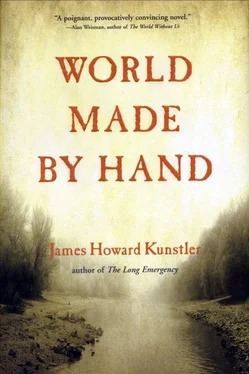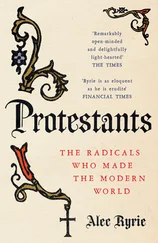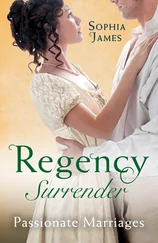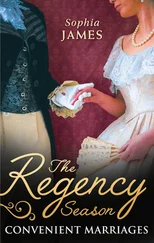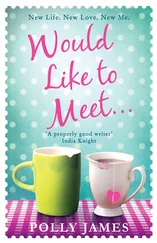“Robert,” he said. He proffered a pitcher but I declined for the moment.
“Swell party, Stephen,” I said and burped. “Pardon.”
“The pleasure is ours, I assure you. Tell me something: are you shacked up with the young widow of the unfortunate fellow who got shot some weeks back?”
“I wouldn’t call it that.”
“Doesn’t look so good.”
“People have got the wrong idea,” I said.
“I’m going to have to convene a grand jury on that killing.”
“I thought sooner or later you would.”
“And you’ll be called to give testimony.”
“I expected that too.”
“Just so you know.”
Musicians were tuning up over the PA system inside the barn. It seemed like it had been an awful short break. Something sounded off.
“Who’s that playing inside?” I said.
“That’d be our boys,” Bullock said. “I told them they could play the breaks. They’re not as good as your bunch, but it’ll be good practice for them to play in front of strangers.”
We stood there listening for a while. It was a weird mix: more than one guitar, banjo, bass, a trombone, and a saxophone in there somewhere. When the tuning was done, they went into a raggedy Dixieland version of “Bye Bye Blackbird,” the kind of thing you might have heard on a Carnival Cruise in the old days.
“Hey, let me ask you something, Stephen: just what do you suppose I’m doing with that young widow?”
“I really don’t know,” he said. “Is she here with you tonight?”
“No, she’s back in town, because she knows everybody would be giving her the hairy eyeball.”
“That was prudent, at least.”
“Goddammit, Stephen.”
“I’m not being facetious.”
“Do you think she should go out and get a job selling real estate or something? Maybe rent an apartment and mail-order a sofa from Crate and Barrel?”
’Well, obviously…”
“Her house burned down and she has a little girl.”
“She can come over here and live,” he said. “We could use a young female. And a child too. Our people are not reproducing that well.”
“You’re as bad as Brother Jobe.”
“Well, we’ve got similar problems, both of us having to look out for large organizations with complicated social considerations in extraordinary times. You think this all just runs itself?”
“I’m well aware of your responsibilities, Stephen.”
“Hell, you’re welcome to come over here, Robert, and bring the young widow and child with you. I’d build you all a house if you did.”
“Thanks, but I like living in town.”
“The invitation stands if you change your mind.”
He patted me on the shoulder and headed back to the party. The band had moved on to “Mack the Knife.” It made me wonder what Bertolt Brecht might think of how we were living now. It made me painfully aware of how over the twentieth century was. Even more oddly, it prompted me to remember the night long ago when, by happenstance, I sat through part of a Wayne New ton show in Las Vegas. Where did Wayne Newton go when the USA went to shit? I was more stoned than I had realized. And so when I saw Jane Ann come toward me in her sparkling blue gown in the moonlight I was dazzled by the sight of her.
She took me by the hand, and we walked up a grassy lane into the orchard behind Bullock’s house. She didn’t have to say anything. I was suddenly on fire for her. We sat down in the cool grass up in the orchard, and she hiked her gown over her head in a single swift motion so that she was just pale skin, silvery hair, and fragrance lying before me in the grass. I was less agile getting free of my own clothing, and my hunger for her was, as always, sharpened by the ache of my moral failure. Then we were upon each other, and everything beyond the field of our senses fell into darkness for a while as we enacted the old urgencies.
Afterward we lay side by side under a plum tree looking at the stars through boughs laden with early fruit, waiting for our hearts to stop pounding. Bullock’s band was playing an old standard I recognized, but I couldn’t remember the title to save my life.
“What’s that tune?” I said.
“Beyond the Sea,” Jane Ann said. “Has she come to your bed yet?”
“No,” I said.
“She will.”
“Maybe she’s got more moral fiber than I do.”
“Women are not moral animals,” she said.
“What a thing to say.”
“Look at me: the minister’s wife.”
“I see someone sweet and beautiful and kind.”
I heard voices and saw shapes moving darkly up the grassy lane. Jane Ann and I automatically shielded our faces. A man and a woman tumbled past us perhaps ten yards away. Apparently they didn’t see us. The woman tripped on something and giggled. I thought it sounded like Annabelle. The man said, “Sssshhhh,” drunkenly. Whoever it was, he had a beard, so he was not one of the New Faith men. He helped her up. They both laughed and continued on. You had to marvel at the determination of that bunch.
“You must think I’m pathetic,” Jane Ann said when they were out of earshot.
“You don’t have to run yourself down.”
“What do you think of me?”
“You’re a human being in an odd situation in a strange time.”
“How diplomatic.”
“It’s how it is.”
“Maybe we’re just wicked, Robert.”
“I wouldn’t encourage you to think so.”
“It’s getting to Loren.”
“Do you two ever talk about this?”
“Are you crazy?” she said.
“I’m not there when you two are alone. I don’t know what you talk about.”
“Do you ever talk to Loren about how you’re fucking his wife when the two of you are off on one of your fishing adventures?”
“Of course not. Do you want me to?”
“Don’t be ridiculous.”
“Maybe we should just stop this, then.”
“If you do, I’ll kill myself.”
“That’s a heckuva thing to say.”
Jane Ann started to cry quietly. “Why her and not me?”
“I can’t bust up you and Loren.”
“Why not?”
“Do you want to leave him? Is that what you’re saying?”
“I don’t know,” she said and cried some more.
We didn’t speak for a while. Jane Ann continued crying quietly, squeezing my hand. Meanwhile the music had stopped, and then I heard instruments tuning up again, including a fiddle, Bruce Wheedon of our bunch, since the others hadn’t had a fiddle, and I realized I had to get back down there.
“We’re on again,” I said. “I have to go back in and play.”
“Okay,” she said. “You go. I’ll come down in a little while, after a decent interval.”
“You know if you killed yourself I would be very sad and guilty for the rest of my life.”
“I know,” she said. And I then left her up there under the plum tree.
I grabbed another pitcher of cider from the bar on my way inside, relieved to be back in the crowd with the electric lights and the laughter. We played some more square dance tunes, including a grand version of Brother Jobe’s requested “Virginia Reel.” Eric’s pipe went around again, and someone passed a whiskey jug and after a while we found our way into the old rock and roll songs, starting out with “The Midnight Hour” and moving through “Bring It on Home to Me,” “Under the Boardwalk,” “Twist and Shout,” “I Can’t Get No Satisfaction,” and “Be My Baby.” It felt pretty odd with only acoustic instruments-and my fiddle parts on the last two numbers were flat-out ridiculous-but Andy and Eric were both good singers (and had been in electric bands when they were kids), and Linda Allison, Bonnie Sweetland, and Jeanette Copeland climbed onstage to sing backup, vamping it up with all the little hand claps and steps in unison, and the saxophone player from Bullock’s band joined in too, and it was sure fun, whatever it sounded like. Out on the dance floor, everybody was dancing in the old style, orgiastically, with hips swinging and arms flailing-even Brother Jobe and the New Faithers-and things got a little blurry for me after that.
Читать дальше
